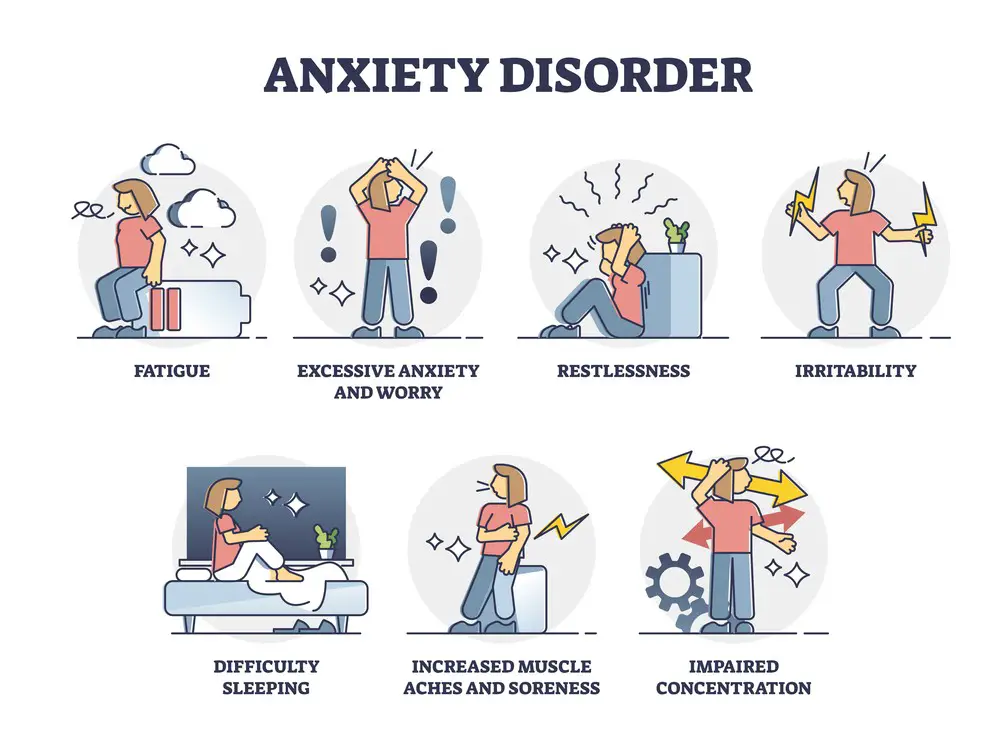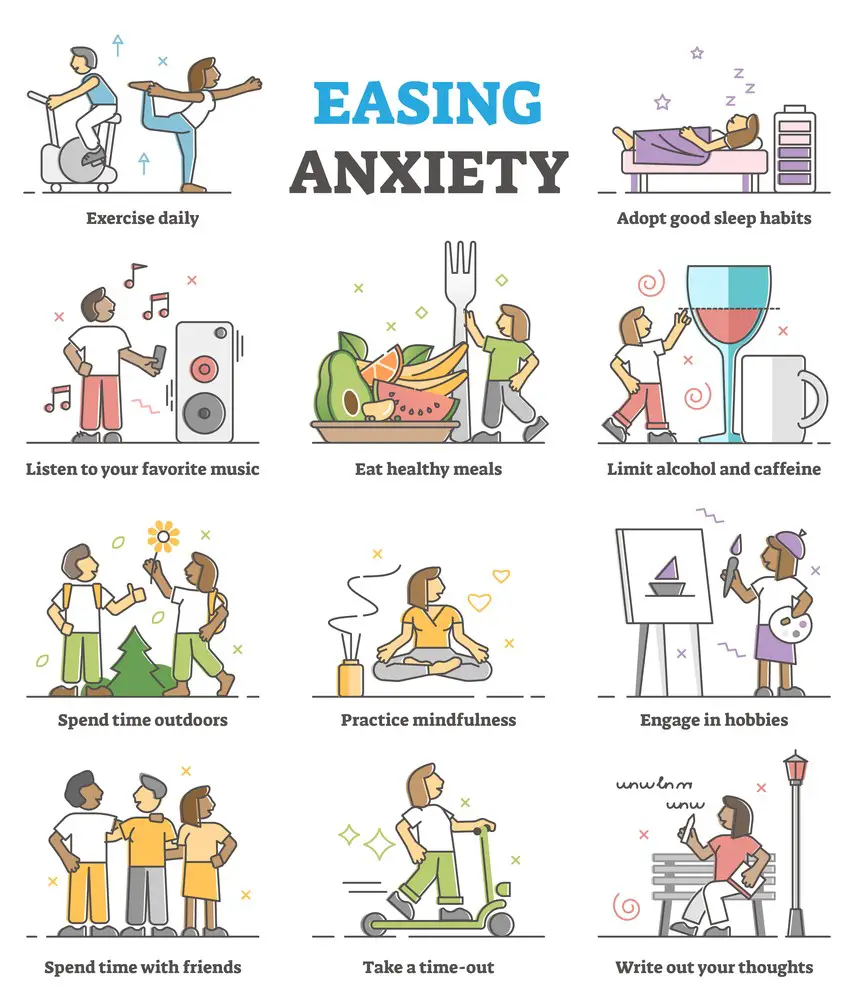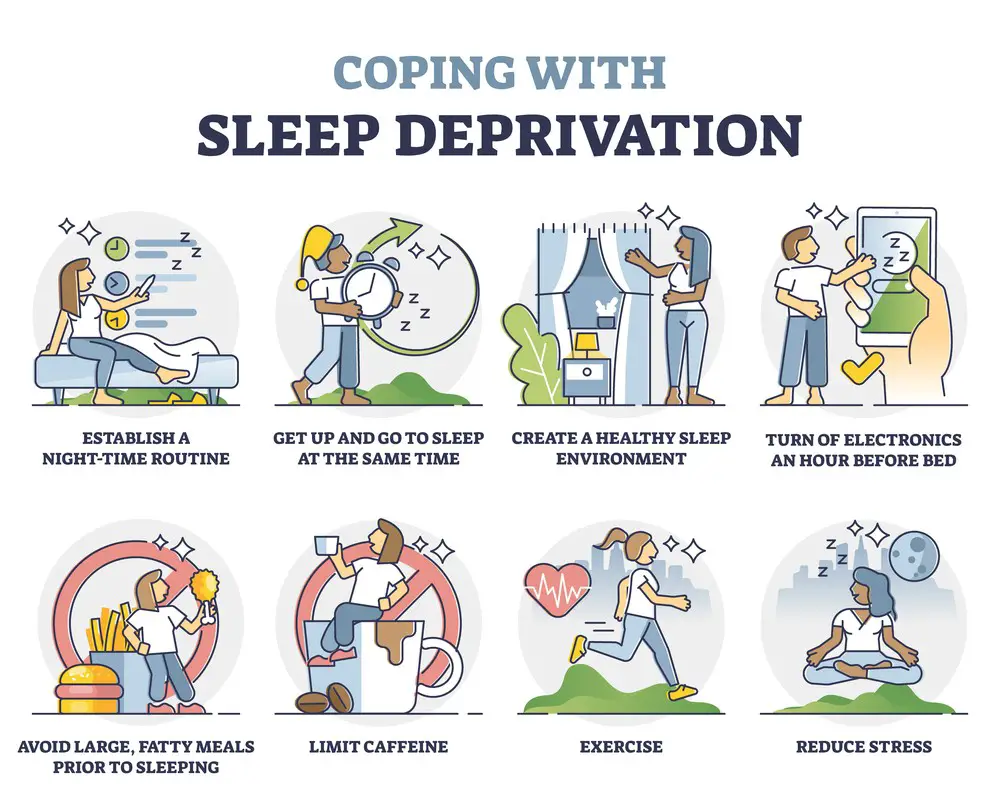As a BetterHelp affiliate, we receive compensation from BetterHelp if you purchase products or services through the links provided
It’s common for sleep and anxiety to become intertwined, which can cause restless nights and emotional distress. One effective approach to tackling this challenge is through the power of prayer. Connecting with a higher power and seeking comfort in faith can bring solace and tranquility, leading to better sleep and reduced anxiety.
Prayer offers a way to confront our anxieties head-on and turn them over to a higher power, allowing us to understand our emotions better and find the strength to tackle life’s obstacles. As we seek guidance, we open ourselves to receiving wisdom and support, helping us navigate challenges and cultivate patience, leading to a more peaceful sleep at night.
Key Takeaways
- Prayer helps in addressing sleep issues and anxiety by connecting with a higher power
- Seeking guidance and wisdom through prayer can provide support in overcoming life’s challenges
- Cultivating patience and understanding leads to a more peaceful sleep at night
Understanding Anxiety

Anxiety is a common feeling you might experience in your daily life. It’s characterized by apprehension, worry, and fear, which can lead to physical symptoms like rapid heartbeat and shallow breathing. In a lot of cases, anxiety is a natural response to stress, but sometimes it can become excessive, leading to anxious thoughts, fears, depression, and even sleep disturbances.
Facing different stressors in life, such as work, relationships, or financial issues, can trigger anxiety. It’s important to realize that experiencing anxiety in certain situations is customary and even helpful, as it can prepare you for potential challenges. However, when anxiety starts interfering with your day-to-day functioning and affects your overall well-being, it may become a disorder.
Here are some common types of anxiety that you might be experiencing:
- Generalized Anxiety Disorder (GAD): persistent and excessive worry about various aspects of your life, making it hard for you to relax or concentrate.
- Social Anxiety: an intense fear of being judged or embarrassed in social situations, causing you to avoid social interactions.
- Panic Disorder: characterized by sudden episodes of intense fear and panic, coupled with physical symptoms like chest pain and shortness of breath.
- Phobias: an irrational fear or aversion to specific objects or situations.
By recognizing the source of anxiety, you can tailor your coping strategies accordingly:
- Practicing relaxation techniques, such as deep breathing exercises or progressive muscle relaxation.
- Exercise regularly to release endorphins, which will help reduce stress and anxiety.
- Aim for a balanced diet, limiting caffeine and sugar intake.
- Develop a bedtime routine to promote relaxation and prepare the body for sleep.
In some cases, professional help may be necessary. Don’t hesitate to reach out to a mental health professional, such as a therapist or psychiatrist, who can provide guidance and resources to help you manage your anxiety effectively.
Remember, understanding your anxiety is the first step towards better coping and, ultimately, improved well-being.
The Power of Prayer

Prayer is a powerful tool that can bring comfort, strength, and peace to your life. In moments of anxiety or struggling to fall asleep, turning to prayer can have a profound impact. Connecting with God will give you the love and faith you need to overcome your challenges.
As you face anxiety and sleepless nights, remember that God’s love is unconditional. A heartfelt prayer for strength can help you draw on His power and love. Speak with Him honestly and openly about your struggles, and let His love bring you tranquility.
Some specific prayers for anxiety and sleep include:
- Prayers for sleep:
- “Lord, I lay me down to sleep; I pray that Your love will envelop me in a peaceful slumber.”
- “God, please grant me the serenity to rest and release the day’s worries into Your loving care.”
- Prayers for anxiety:
- “Dear God, I ask for Your guidance and strength in overcoming my anxious thoughts.”
- “Mighty name of Jesus, please calm my restless thoughts and bring me inner peace.”
When you find yourself in need of prayer for anxiety and depression, remember that faith is critical. Trust in God’s divine plan, and allow your faith to guide you through difficult times. By turning to Him in prayer, you can tap into His strength and wisdom for dealing with these trials.
Key Takeaway: Prayer is a powerful means of finding comfort, strength, and peace during anxiety and sleeplessness. Connect with God and trust in His love to help you overcome your challenges.
Connecting With God

Sometimes, anxiety and sleepless nights make you feel overwhelmed and alone. Connecting with God can comfort you and restore your peace in moments like these. Remember, God is your Heavenly Father, always there for you, offering a listening ear, encouragement, and guidance.
Begin by addressing God as your Abba, a term that denotes your intimate relationship with your Gracious Sovereign Lord. Doing so lets you feel more connected and open to sharing your feelings and thoughts with Him.
Here are a few tips to deepen your connection with God as you pray:
- Find a comfortable and quiet place: Choose a space where you can be free from distractions, allowing you to focus solely on interacting with your Father.
- Focus on His presence: Remember that God is always with you, even in moments of struggle. Internalize this truth as you speak with Him throughout your prayer.
- Seek guidance from Scripture: Use verses from the Bible to guide you in your conversation. They can provide the words you need to express your feelings, desires, and worries.
- Be honest and open: Tell God exactly how you feel, and don’t hold back. Share your fears, hopes, and anxieties as you would with a loved one.
During your prayer, remember that God is compassionate and understanding – He knows you better than anyone else. As you pour out your heart to your Heavenly Father, you’ll be reminded of His love and patience, which can help alleviate your anxiety and bring peace to your restless nights.
Lastly, don’t forget to listen. Prayer is a dialogue; sometimes, God speaks to us through silence or a still, small voice. Allow space for His response, and be open to the peace and comfort He provides. Doing so will strengthen your relationship with God and find rest for your weary soul.

Seeking Peace and Rest
As you struggle with anxiety, finding peace and rest can feel like an uphill battle. But don’t worry; there are ways to bring tranquility and restful sleep into your life. Let’s explore strategies to help you heal your restlessness and achieve peaceful sleep.
Start by creating a comforting environment in your bedroom. Choose calming colors, soft lighting, and cozy bedding that makes you feel at ease. Some people find that sounds of nature, such as ocean waves or gentle rain, help set the mood for restful sleep. Consider using a sound machine or soothing playlist to fill your room with pleasant sounds.
To quiet your mind before bedtime, try incorporating a relaxation routine. Deep breathing exercises, progressive muscle relaxation, or guided meditation are beneficial. Websites and apps like Calm or Headspace can provide helpful resources for your nightly routine. Remember, consistency is key, so pick a practice that resonates with you and stick to it.
- Write down your worries: Sometimes, just writing down your anxieties can help release them from your mind and put your concerns to rest.
- Say a quiet prayerr: Focusing on something spiritual or asking for divine assistance with your worries can bring peace to your thoughts.
- Do gentle stretches: Stretching your body can release tension and stress, helping you find a sense of calm before sleep.
Incorporating these habits into your daily life can gradually improve your ability to find peace and restful sleep. Remember, changes may not happen overnight, but consistency and dedication will help you achieve a more peaceful state of mind, leading to restoring sleep. Patience and self-compassion are your allies in this journey. Keep practicing, and soon, you’ll be experiencing the tranquility and rest you deserve.
 Overcoming Fear
Overcoming Fear
Fear can be paralyzing, but with courage and trust, you can overcome even the most challenging situations. It’s natural to feel anxious, but you can find refuge in calming practices like prayer.
Remember to rely on your faith as a source of comfort and protection when feeling scared or anxious. Trust that everything will work out, and let go of negative thoughts. Here are some suggestions to help you:
- Take deep breaths and focus on the present moment.
- Envision yourself in a safe place and let your mind wander there.
- Surround yourself with positive messages and people who support you.
- Seek wisdom and guidance from spiritual texts.
- Share your fears and feelings with someone you trust.
Sometimes, digging deep and finding the courage to face your fears is essential. When doing this, you might:
- Break down your fear into smaller, manageable parts.
- Set achievable goals and celebrate each accomplishment.
- Focus on the positive aspects of your life, and remember past victories.
- Encourage yourself with affirmations and positive self-talk.
Finally, it’s important to remember that seeking refuge and protection through prayer can bring comfort in times of doubt and anxiety. Allow the soothing power of prayer to:
- Calm your mind and ease tension.
- Give you strength and perseverance in challenging situations.
- Provide clarity and guidance in decision-making.
- Help you stay focused on your purpose.
In conclusion, addressing your fears with courage and finding refuge in prayer are effective ways to combat anxiety. You’ll notice a greater sense of peace, comfort, and self-confidence as you incorporate these practices into your life. Remember, you’re never alone.
 Building Trust
Building Trust
When dealing with sleep and anxiety, building trust in oneself can be an essential step towards finding relief. You might wonder, how does trust relate to sleep and anxiety? Giving yourself the confidence to manage and overcome these challenges can lead to a calmer, more restful night.
Let’s start with fostering trust in your coping abilities. This means believing in your capability to handle stress and feeling assured that the anxiety won’t control your life. Here are some tips to begin your trust-building journey:
- Practice deep breathing: Deep breathing exercises can help you feel more relaxed and regain control in stressful situations.
- Keep a worry journal: Write down what’s on your mind before bed to create mental space for relaxation.
- Positive affirmations: Repeat reassuring statements to yourself, like “I am strong and can handle my anxiety.”
- Break down tasks: Divide bigger tasks into smaller, manageable steps to make them less overwhelming.
Remember, you can also cultivate trust in external factors that help alleviate anxiety and improve sleep. These can include:
- Seek professional help: Don’t be afraid to contact mental health professionals for guidance and support.
- Follow a sleep routine: Establishing a consistent bedtime ritual can signal your body and mind that it’s time to relax and sleep.
- Modify your sleep environment: Create a comfortable sleep space by adjusting temperature, darkness, and noise levels.
- Utilize relaxation techniques: Explore techniques like progressive muscle relaxation, mindfulness, or guided imagery to find what works best for you.
Developing trust is an ongoing process, and being patient with yourself is essential. You will gradually improve your sleep and diminish anxiety by fostering confidence and relying on your abilities. Remember, you’re not alone in the journey; numerous resources and techniques are available to help you along the way.
Finding Strength
In times of anxiety and sleeplessness, finding strength within yourself is crucial. You possess an innate resilience that can guide you through difficult moments. Let’s explore ways to cultivate the courage and strength you need to overcome sleep issues and anxiety.
Incorporating daily habits can be a powerful technique to build your inner strength. Here are a few strategies to practice:
- Meditate: Implementing a daily meditation routine allows you to connect with your inner self. Meditating even for a few minutes daily can provide that much-needed centering, helping to ground you and increase your sense of calm.
- Gratitude: Remind yourself of the positive aspects of your life. Every morning or evening, list down three things you’re grateful for. Practicing gratitude builds happiness and fosters an optimistic outlook on life.
- Connect with nature: Stroll through your local park or spend time outside to alleviate stress and anxiety. Your spirit will feel lighter, and you’ll gain a renewed resilience.
- Acknowledge your emotions: Recognizing feelings of anxiety instead of suppressing them, can help you accept and manage those difficult emotions. This promotes confidence, which can lead to more restful sleep.
Another way to reinforce your strength is to lean on your support system – your family, friends, and loved ones. Sharing your struggles and seeking your insights is not a sign of weakness but rather an opportunity for personal growth. Remember, it’s okay to ask for and accept help when you need it.
Visualizing yourself as courageous and resilient can also work wonders. Spend a few moments each day imagining your most courageous version. Envision yourself as a strong person who can cope with challenges gracefully. Your mind has immense power. By regularly visualizing yourself in this way, you’ll gradually see that strength become a reality.
Key takeaway: Cultivating inner strength and resilience is essential when facing sleep and anxiety issues. With daily habits, visualization, and the support of others, you’ll foster courage and confidence that lead to improved mental well-being and better sleep.
Gaining Understanding
Gaining understanding in the relationship between prayer, sleep, and anxiety is essential. Doing so will give you wisdom and clarity and develop the discipline needed for maintaining mental and emotional well-being.
It’s no secret that our fast-paced lives can contribute to anxiety and sleepless nights. If you’ve ever found yourself tossing and turning in bed, holding onto your racing thoughts, you’re not alone. But fear not; incorporating prayer into your daily routine can help! Here are some tips on how to gain an understanding of this connection:
- Educate yourself: Read books, articles, and research studies about the benefits of prayer on mental health and sleep. This fundamental step will provide insight and solidify prayer’s significance.
- Take it step by step: Start by setting aside a few minutes each day for prayer or meditation. As you become more comfortable, gradually increase the time spent in this practice. The key is consistency!
- Get personal: Customize your prayers or affirmations to suit your individual needs. Focus on what you require to alleviate anxiety and encourage restful sleep. Remember, it’s all about you!
- Learn from others: Engage in conversations with friends, family, or members of your spiritual community to gain insights into their experiences with prayer, sleep, and anxiety management. This can be an invaluable source of wisdom and support.
Now that you understand this relationship better, don’t forget to put it into practice! Your mental and emotional well-being is important, and prayer might just be that extra tool to help you overcome anxiety and promote restful sleep. Everyone is different, so don’t be too hard on yourself if results take time. Stay persistent and have faith in your journey!

Transcending Stress
Feeling stressed and overwhelmed? You’re not alone. It’s completely normal to experience stress and anxiety in your daily life. It’s time to take a step back and focus on some strategies that can help you transcend stress and find relief.
First, take a deep breath and let it out slowly. Focusing on your breath can help anchor you in the present moment, providing immediate relief from stress and anxiety. Try practicing different breathing techniques, such as a diaphragmatic, alternate nostril, or 4-7-8 breathing.
Next, incorporate meditation or prayer into your daily routine. Studies show regular meditation and prayer can help reduce stress and promote relaxation. By setting aside time each day to engage in these practices, you’ll create a habit that can help keep your stress levels in check. There are numerous forms of meditation and prayer to explore, so experiment to find the one that resonates with you.
- Take up journaling to help process your thoughts and emotions. Writing down your mind can help you gain clarity and release stress.
- Prioritize self-care by engaging in activities that bring you joy and relaxation. This could include a warm bath, a walk in nature, or curling up with a good book.
- Contact friends or a support group to share your feelings and experiences. Talking with others helps alleviate the burden of stress and can provide valuable insights and advice.
Incorporate physical activity into your life. Exercise is a powerful way to reduce stress and anxiety. Find an activity you enjoy and make it a part of your routine. It could be anything from walking, swimming, or practicing yoga.
Lastly, focus on positive affirmations. Speaking kindly to yourself can have a huge impact on your mental well-being. Repeat positive statements like “I am strong,” “I am capable,” or “I am at peace” to help shift your mindset.
Remember, you have the power to manage stress and relax your anxieties. Incorporating these strategies into your daily life will pave the way for a healthier, more resilient you.
Embracing Love and Compassion
Sometimes, anxiety and trouble falling asleep can stem from a place of unprocessed emotions or unresolved conflicts. Finding a space of love and compassion in your heart can help you alleviate these overwhelming feelings.
Begin by welcoming feelings of love, compassion, forgiveness, and grace. Recognize these emotions’ power in healing the troubled mind, and see them as the keys to unlocking a peaceful night’s sleep. Remember, everyone deserves love and understanding, including yourself.
Try implementing the following strategies in your daily routine:
- Practice self-love: Nurture yourself with kind words and actions throughout the day. Seek out activities that bring joy and fulfillment. Remind yourself that you are deserving of care and respect.
- Cultivate forgiveness: Forgive yourself for any mistakes or imperfections, and extend that forgiveness to others. Let go of grudges and lingering resentments, recognizing the freedom and relief from releasing negative emotions.
- Express gratitude: Acknowledge the blessings in your life, big or small. Focus on the positive experiences and people that surround you. Cultivate an attitude of gratitude, even in the face of challenges.
- Meditate on compassion: Dedicate time each day to sit in quiet contemplation and focus on feelings of compassion and love toward yourself and others. Use guided meditations or apps to help you develop this practice.
Remember to let go of stress and worry and embrace love and compassion as you face life’s challenges. This newfound peace will ease your anxiety and prepare your mind for a restful night’s sleep.
Maintaining Control
Feeling anxious before bed? You’re not alone. The good news is that taking control and maintaining discipline in your bedtime routine can help you combat anxiety and sleep better. Let’s explore some strategies to achieve this.
First, establish a soothing bedtime routine. This could include reading a book, taking a warm bath, or practicing deep-breathing exercises. These calming rituals signal to your body that it’s time to unwind and prepare for sleep. Stick to these routines and make sure they’re non-negotiable for you.
Next, limit exposure to screens before bedtime. Blue light emitted by smartphones, computers, and televisions can interfere with your sleep by suppressing melatonin production. Create a tech-free zone in your bedroom and avoid screens at least one hour before hitting the sack.
Don’t forget the power of regular exercise. Physical activity can help you get rid of built-up energy and reduce anxiety, making it easier to fall asleep at night. Aim for at least 30 minutes of moderate-intensity exercise daily, but remember to finish it a few hours before bedtime.
Here’s a quick summary of tips for maintaining control:
- Establish a calming bedtime routine
- Limit screen time before bed
- Engage in regular physical activity
Lastly, consider practicing mindfulness and meditation. These techniques can help you regain control over your anxious thoughts by increasing self-awareness and promoting relaxation. Try dedicating a few minutes each evening to deep, focused breathing or exploring guided meditation apps.
Remember: taking control and maintaining discipline over your bedtime habits can significantly impact your sleep quality and anxiety levels. Incorporate these practices into your daily routine, and you’ll be well on your way to a better night’s rest.
 Optimizing Sleep
Optimizing Sleep
A good night’s sleep often seems elusive, especially when anxiety is in the picture. But don’t lose hope, a powerful night prayer can help you wind down and improve your sleep quality.
First off, establish a consistent sleep schedule by going to bed and waking up at the same time each day, even on weekends. This helps regulate your body’s internal clock, making it easier to fall asleep and stay asleep throughout the night.
Next, create a bedtime routine that includes night prayer. This routine should help signal to your body that it’s time to wind down. Choose a peaceful, calming prayer like the Nafila or calming Quranic verses that resonate with you. Prayer helps to clear your mind, reduce anxiety, and prepare you for a restful night.
Remember, a comfortable sleep environment is essential for a good night’s rest. The bedroom should be dark, quiet, and cool. You may want to invest in blackout curtains, earplugs, or a white noise machine to help create this environment.
Here are a few other practical tips for optimizing your sleep:
- Exercise during the day, but avoid strenuous activities close to bedtime as it may cause sleep disruption.
- Limit caffeine intake in the afternoon and evening as it can interfere with sleep.
- Avoid screens an hour before bed, as the blue light emitted by phones, tablets, and computers can suppress melatonin production.
- Relax before bed: a warm bath, meditation, or gentle stretching can aid relaxation and create a better state of mind for sleep.
Nightmares and vivid dreams can also disrupt sleep and increase anxiety levels. In your prayers, ask for the guidance and protection of your dreams from any disruptions or negative emotions.
A consistent night prayer routine, combined with the tips above, can help soothe your mind and lead to a night of better, stress-free sleep. Remember, a restful night’s sleep is essential for your physical and mental well-being.
Healing the Body and Mind
You might be surprised to learn that prayer can be a powerful tool for healing your body and mind, especially when you’re dealing with sleep issues and anxiety. Not only can it help soothe your physical pain, but it can also provide mental and emotional relief.
One of the keys to using prayer for healing is to focus on your faith and trust in a higher power. It’s important to know that you’re not alone in your struggles and that there’s a source of strength and compassion available to support you during difficult times.
Prayer allows you to:
- Release stress and anxiety: By connecting with your spiritual beliefs, you can let go of the worries and fears that are keeping you awake at night. This can provide a sense of peace and tranquility, making it easier to fall asleep.
- Improve self-awareness: Through prayer, you can develop a deeper understanding of your emotions and the sources of your anxiety, allowing you to gain control over your mental state.
- Promote feelings of gratitude: Reflecting on your blessings rather than your troubles can help shift your focus and create a more positive mindset.
Here are some tips to get started with prayer for healing:
- Find a quiet, comfortable space where you can focus. It doesn’t have to be a designated “prayer area”; it can be your bedroom, a living room corner, or even a park bench.
- Choose a time when you’re least likely to be interrupted. This might be first thing in the morning, before bedtime, or during a break in your day.
- Speak from your heart. Express your concerns, thoughts, and desires, and don’t forget to express gratitude for the good things in your life.
- Slow your breathing and take deep, calming breaths as you pray. This can help lower your stress level and create a calming effect on your mind and body.
Remember that it may take time to experience the full benefits of prayer for healing. Be patient and trust in the process as you continue incorporating this practice into your daily life. In time, you may find that prayer becomes a cherished source of comfort, strength, and well-being.
Guidance for the Journey
Embarking on a journey to ease your anxiety and improve sleep through prayer begins with setting the right intention. Seek guidance and direction from a higher power to unlock your potential and fulfill your desires.
Prayer can work wonders, but remember, patience is key. It requires dedication and consistency to see results. To make this journey smoother, here are some tips:
- Set aside time – Dedicate specific moments in your day for prayer. Make it a routine, even if it’s just 10 minutes before bedtime.
- Create a peaceful environment – Choose a quiet, comfortable space to focus, free from distractions.
Incorporate these strategies to improve your prayer sessions:
- Use visualization – As you pray, picture your anxiety lifted and replaced with inner peace.
- Practice deep breathing – Take slow, deep breaths to calm your mind as you pray.
- Say scriptures or affirmations – Recite passages from your faith tradition or create personalized affirmations to help with anxiety and sleep.
Here are a few additional ideas to help you on your journey:
- Evaluate your desires: Explore and understand what you truly want to achieve through your prayers: mental peace or sound sleep.
- Be gentle: Don’t be too hard on yourself if you don’t see immediate results. Give yourself the time and space to grow.
Remember, take heart in the support and wisdom when seeking guidance and direction. Embrace the journey with patience and trust in your higher power to guide you toward more profound tranquility and restful sleep.
Navigating Challenges
When you face challenges, remember that hope and the power to overcome anxiety are within you. You can utilize prayer to cope with these challenges and get a good night’s sleep. Here are some tips to help you on this journey:
- Take a moment to reflect: Pause and take a deep breath when facing a challenge. Gather your thoughts and identify the source of your anxiety. Reflecting on the situation will help you find clarity and pave the way for seeking divine guidance.
- Jot down your thoughts: Writing your worries down can help ease your mind. List the challenges you currently face or the things causing sleeplessness. This can help you focus and direct your prayers to address those concerns.
- Find a quiet space: Creating a calm environment is crucial for effective prayer. Set aside a dedicated space to comfortably sit and meditate without distractions. This will help you concentrate and improve the connection with your spiritual side.
- Speak from the heart: When praying, be genuine and sincere. Use your own words to express your feelings, anxieties, and requests for help. Being open and honest during prayer can lead to a deeper connection and greater peace of mind.
- Visualize positive outcomes: As you pray, imagine overcoming your challenges. Picture yourself reaching your goals, conquering your fears, and enjoying a peaceful sleep. Positive visualization can help reduce anxiety and promote relaxation.
Remember to practice these strategies regularly to see their full benefits. Prayer can be a powerful tool in your life, not only to help you navigate challenges but also to bring about a sense of calm and balance. With patience and perseverance, you’ll overcome anxiety and sleep more peacefully.

Promoting Joy and Gratitude
Feeling joy and gratitude before bedtime can help alleviate anxiety and improve sleep quality. One practical way to promote these emotions is to take a few moments each night to appreciate the blessings in your life. Here’s how:
Begin by finding a quiet and comfortable space for prayer or reflection. Close your eyes and take several deep breaths, allowing your mind to quiet down and your body to relax. As you breathe in, imagine peace and calm entering your being, and as you exhale, visualize stress and worry leaving.
Next, think about the positive aspects of your day. It could be a sunny day, a kind word from a friend, or completing a task you’ve been putting off. Acknowledge these moments of joy and give thanks for them. By doing this, you’re training your mind to focus on the positive aspects of your life and develop an attitude of gratitude.
Now, consider the people who bring you joy and support. Offer a prayer of thanksgiving for their presence and ask for emotional guidance and strength for yourself and those you care about. Sending out positive energy and blessings to others strengthens your connections and reinforces a happy and grateful mindset.
To further nourish this newfound sense of gratitude and joy, try incorporating some of the following practices into your daily routine:
- Keep a gratitude journal, listing the things you’re grateful for each day
- Pray or meditate regularly, focusing on positive emotions and thankfulness
- Surround yourself with motivational quotes or images that inspire you
- Practice self-compassion by treating yourself with kindness and understanding
Incorporating these habits into your daily life can lead to a healthier, happier mental state, benefiting your sleep quality and overall well-being. Remember, nurturing joy and gratitude is an ongoing process – be patient, and allow yourself the time to grow and flourish in these positive emotions.
Cultivating Patience
In today’s fast-paced world, anxiety can easily creep in, and sleep deprivation becomes a common issue. To counter these, cultivating patience can act as a gateway to peace and tranquility. Here’s how you can embrace patience in your daily life.
First, acknowledge that patience is a skill; like any skill, it requires practice. When practicing patience, don’t be too hard on yourself; allow for gradual progress. You can try deep breathing exercises or mindfulness meditation to help you stay calm in challenging situations.
To create a routine that encourages tranquility, consider the following:
- Set aside a few minutes daily for prayer or meditation, which fosters inner peace and patience.
- Devote time to activities that bring you joy and relaxation, such as hobbies or exercise.
- Surround yourself with positive people and environments that nurture your patience and emotional well-being.
Next, focus on self-reflection. Understanding your triggers can help you maintain patience during stressful moments. When you feel impatient or anxious, pause and ask yourself why you’re feeling this way. This self-awareness can support a more peaceful mindset.
Incorporate patience-centered affirmations in your daily life. Affirmations can be empowering; repeat statements like “I am patient, calm, and relaxed” or “I find peace in the present moment.” You can practice these affirmations before bedtime to help create a restful environment for sleep.
Remembering that patience is also about forgiving ourselves and others is essential. Let go of grudges and negative emotions that can rob you of your peace of mind. Practicing compassion and empathy strengthens our capacity for patience.
Incorporating the cultivation of patience into your life can help reduce anxiety and encourage better sleep. By focusing on patience, you’ll be more equipped to handle life’s challenges, leading to greater peace and tranquility.
Seeking Truth
When it comes to dealing with sleep and anxiety, truth is a powerful tool that can help you find peace. As a believer, you can look towards God’s word in the Bible to provide guidance and support during difficult moments. Let’s explore how incorporating truth into your prayer life can lead to restful sleep and a calmer mind.
Remember Philippians 4:6: “Do not be anxious about anything, but in every situation, by prayer and petition, with thanksgiving, present your requests to God.” This verse is a beautiful reminder that you don’t need to carry the weight of your worries alone. Just reach out to the Lord in prayer, and He will be there to provide comfort and guidance.
Consider these tips while seeking truth through prayer:
- Reflect on God’s promises in the Bible, and believe He is always by your side.
- Speak to Him openly and honestly about your feelings of anxiety and your need for better sleep.
- Thank Him for the blessings in your life, both big and small.
- Ask for His wisdom, guidance, and strength to help you overcome your current struggles.
As you pray, try to adopt a mindset of trust in God’s ability to provide for your needs. Remember, working through anxiety and sleep issues doesn’t happen overnight. It may take time to see the full effects of seeking truth. Just stay persistent in your prayers and open to God’s guidance. Ultimately, your faith and trust in the Lord will provide a sense of peace and calm, leading to better sleep and reduced anxiety.
Practicing Surrender
Life can be hectic, and anxiety often follows suit. Taking a moment to practice surrender can help you overcome restless nights and ease your worries. So, let’s explore how to release your fears and truly let go.
First, find a quiet spot to sit or lie down comfortably. Close your eyes and take a few slow, deep breaths to help calm your body and mind. As your thoughts wander, remember that surrendering is a path to freedom.
Imagine all your worries as if they were leaves floating on a calm stream. As you exhale, visualize each concern drifting away, freeing you from its grasp. This is your moment to let go.
Here are some tips to enhance your surrender practice:
- Set a specific time each day for your surrender ritual
- Gently remind yourself that it’s okay to let go of control
- Use soothing scents, such as lavender, to help release tension
- Implement mindfulness techniques, like meditation or journaling
Be patient with yourself as you practice surrendering. It’s a journey that takes time and patience. Embrace the freedom of letting go, and your sleep improves and anxiety subsides. So, permit yourself to surrender and let the peace wash over you.
Final Thoughts
- Adapt Prayers to Fit Personal Beliefs: Whether you follow a specific religious tradition or prefer a more personal, spiritual approach, feel free to modify these prayers to align with your beliefs.
- Consistency Can Help: Regular prayer, especially before sleep or during anxious moments, can create a sense of routine and comfort.
- Combine Prayer with Other Practices: Consider pairing prayer with meditation, deep breathing, or light reading of inspirational texts to enhance the calming effect.
- Sharing Prayers with Others: If you’re comfortable, sharing these prayers with friends or family members who might also benefit from them can spread comfort and support.
- Writing Your Own Prayers: Personalizing your prayers by writing them yourself can make them even more meaningful. Reflect on what brings you peace and incorporate those elements into your prayers.
Above all, the intention and belief behind your prayers make them powerful. Whether you’re seeking peace for yourself or offering support to a friend, the sincerity of your words carries great significance.
Frequently Asked Questions
What is a soothing prayer for good sleep?
A calming prayer could be:
“Dear Lord, Help me to relax and find peace in your presence. Ease my worries and clear my mind, so I may drift into restful sleep. Amen.”
Remember to choose a prayer that resonates personally with you.
Which prayer can help with anxiety and depression?
Here’s a prayer you can use:
“Heavenly Father, Please calm my anxious heart. Fill my mind with your peace, and guide me through this storm. Allow your love to lift me from darkness, as I lean on your strength. Amen.”
Feel free to adapt this to your needs.
What is a short prayer for calming sleep?
Try this brief prayer:
“God, grant me a peaceful night’s sleep. Calm my thoughts and soothe my soul. Amen.”
This simple prayer can be effective in difficult times.
Are there specific Catholic prayers for sleep and anxiety?
Catholics may find comfort in “Night Prayer from the Liturgy of the Hours” or the “Memorare.” Explore various Catholic prayers for more options.
Which Bible verse can provide comfort for anxiety?
Philippians 4:6-7 is a comforting verse:
“Do not be anxious about anything, but in every situation, by prayer and petition, with thanksgiving, present your requests to God. And the peace of God, which transcends all understanding, will guard your hearts and your minds in Christ Jesus.”
Discover verses that speak to your heart for additional comfort.
How can I pray for a friend struggling with anxiety?
You can pray:
“Dear Lord, Please comfort and support my friend through their time of anxiety. Grant them peace, strength, and patience, as they navigate their struggles, knowing that you are with them always. Amen.”
Sincere prayers can be very meaningful.
About Jacob Maslow
After surviving the traumatizing events of 9/11, I took it upon myself to heal through helping others. I’m the primary caregiver of my children and understand from first-hand experience the lonely paths you have to walk as a partner and parent when leaving an unhealthy relationship.
We’re all echoing in a dark space that doesn’t have to be this empty, and that’s been my mission since finding solace and recovery in therapy: To help comfort others who are still in shock and at the prime of their struggle.
I came across BetterHelp after searching for this type of community. I wanted to belong to a body of proactive therapists and supportive therapy veterans who allowed me to see other sides of the story.
It was unconventional, and that’s what attracted me most. During my most challenging times, when my ex-wife completely cut me off from my children, I found comfort and clarity through BetterHelp.
Instead of being chained to a strict therapist recommendation, I was in charge of who I felt understood my struggle most. That allowed me to find my true peace, as I was reunited with those who read behind my words and had first-hand experience with my trauma.
Recovery is a choice; with BetterHelp, that choice will be a few clicks away. You can join their couples-oriented platform, Regain.us, for those stuck with family estrangement and toxic relationship patterns.
- Breaking the Silence: Why Men’s Mental Health Matters More Than Ever - April 15, 2025
- How to Transform a Home’s Patio Space into a Relaxing Space - March 23, 2025
- 5 Strategies to Use a Cell Phone to Help Manage Your Stress - March 23, 2025
This site contains affiliate links to products. We will receive a commission for purchases made through these links.


 Overcoming Fear
Overcoming Fear Building Trust
Building Trust Optimizing Sleep
Optimizing Sleep
